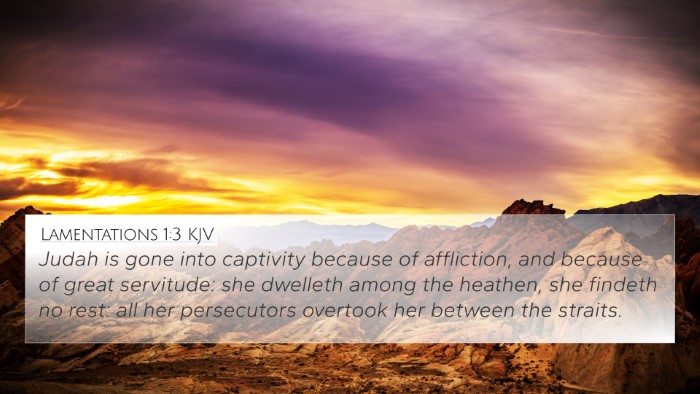Understanding Leviticus 26:33
Leviticus 26:33 states: "And I will scatter you among the nations, and I will draw out a sword after you: and your land shall be desolate, and your cities waste."
Summary of Meaning
This verse reflects God's warning to the Israelites about the consequences of disobedience. It serves as a crucial part of God's covenant with His people, emphasizing the seriousness of straying from His commands.
Commentary Insights
Matthew Henry
Matthew Henry emphasizes that the scattering among the nations signifies God's judgment. The sword mentioned refers to the violence and destruction that will follow disobedience. Henry notes that the promise of the land becomes a curse if misused, illustrating a profound connection between human behavior and divine retribution.
Albert Barnes
Albert Barnes focuses on the social and spiritual implications of scattering. He suggests that being dispersed among gentile nations not only leads to physical displacement but also results in spiritual degradation. The desolation of their land symbolizes a display of God’s displeasure, reinforcing the theme of God’s covenantal relationship with Israel.
Adam Clarke
Adam Clarke discusses the historical context of this verse, highlighting its prophetic nature. He points out that Israel's eventual exile was a culmination of persistent disobedience, showing that God's warnings are often reflections of impending realities. Clarke stresses that the consequences are not solely punitive but serve as a clarion call for repentance and return to God.
Bible Cross-References
- Deuteronomy 28:64-65: Discusses the dispersion of Israel among nations as a consequence for abandonment of God's laws.
- Jeremiah 9:16: Illustrates God's intention to scatter His people as a result of their unfaithfulness.
- Ezekiel 12:15: Further elaborates on the exile and its purpose—showing the uniqueness and divine authority of God.
- 2 Kings 17:18: Details the scattering of Israel due to their agreement with pagan nations and abandonment of God's covenant.
- Isaiah 49:6: Offers a hopeful perspective on the redemption of Israel, suggesting that their scattering serves a greater divine purpose.
- Matthew 24:2: References the destruction of the city of Jerusalem, which illustrates a thematic connection to desolation spoken of in Leviticus 26:33.
- James 1:1: Mentions the "twelve tribes which are scattered abroad," linking back to the themes of diaspora originating from Leviticus.
- Romans 11:1: Discusses God's faithfulness to Israel despite their unfaithfulness, highlighting the enduring covenant relationship.
- Joel 3:2: Prophesies about God gathering nations for judgment, akin to the scattering mentioned in Leviticus.
- Hebrews 11:10: Touches on the idea of seeking a heavenly country, connecting back to the forfeiture of earthly land due to disobedience.
Connections Between Bible Verses
The verse in Leviticus finds its parallels and connections across both the Old and New Testaments. The theme of divine judgment for disobedience resonates through the prophetic texts of Isaiah, Jeremiah, and Ezekiel. Each of these references continues the narrative of Israel's unfaithfulness and the subsequent consequences, further establishing the idea of spiritual exile alongside physical dispersion.
Thematic Bible Verse Connections
The recurring theme in Leviticus 26:33 serves to highlight God's righteousness and justice in dealing with His people. Connections can be drawn to the following themes in other verses:
- Faithfulness vs. Rebellion: The tension between God's promises and human behavior retains its significance throughout scripture.
- Consequences of Disobedience: The historical consequences serve as a warning and call to repentance in the teachings of later prophets and New Testament writers.
- Hope Amid Judgment: Many cross-references also touch on God's promise of restoration, emphasizing that His judgments are not devoid of mercy.
Tools for Bible Cross-Referencing
Utilizing a Bible concordance or Bible cross-reference guide is invaluable for in-depth studies. These tools allow for easy identification of related verses, helping to illuminate deeper understanding and interconnections within scripture. Tools such as a cross-reference Bible study or Bible chain references can enhance your scriptural understanding.
Application for Study
For anyone looking to conduct a comparative Bible verse analysis, examining Leviticus 26:33 in the context of its cross-references can yield rich insights. It is important to note that the linkage between verses often reveals God's overarching narrative regarding His covenant, judgment, and mercy. This inter-Biblical dialogue emphasizes a coherent theological framework that spans both the Old and New Testament.
Conclusion
Understanding Leviticus 26:33 requires extensive exploration of its implications, connections, and relationships to other Biblical texts. By employing a methodical approach using cross-referencing techniques, the rich tapestry of scripture reveals the profound nature of God's relationship with His people—and the consequences when they stray. Thus, this verse not only serves as a warning but also an invitation to return to divine covenant and faithfulness.














